1
Kropp on the other hand is a thinker. He proposes that a declaration of war should be a kind of popular festival with entrance-tickets and bands, like a bull fight. Then in the arena the ministers and generals of the two countries, dressed in bathing-drawers and armed with clubs, can have it out on themselves. Whoever survives the country wins. That would be much simpler and more than just this arrangement, where the wrong people do the fighting .Erich Maria Remarque
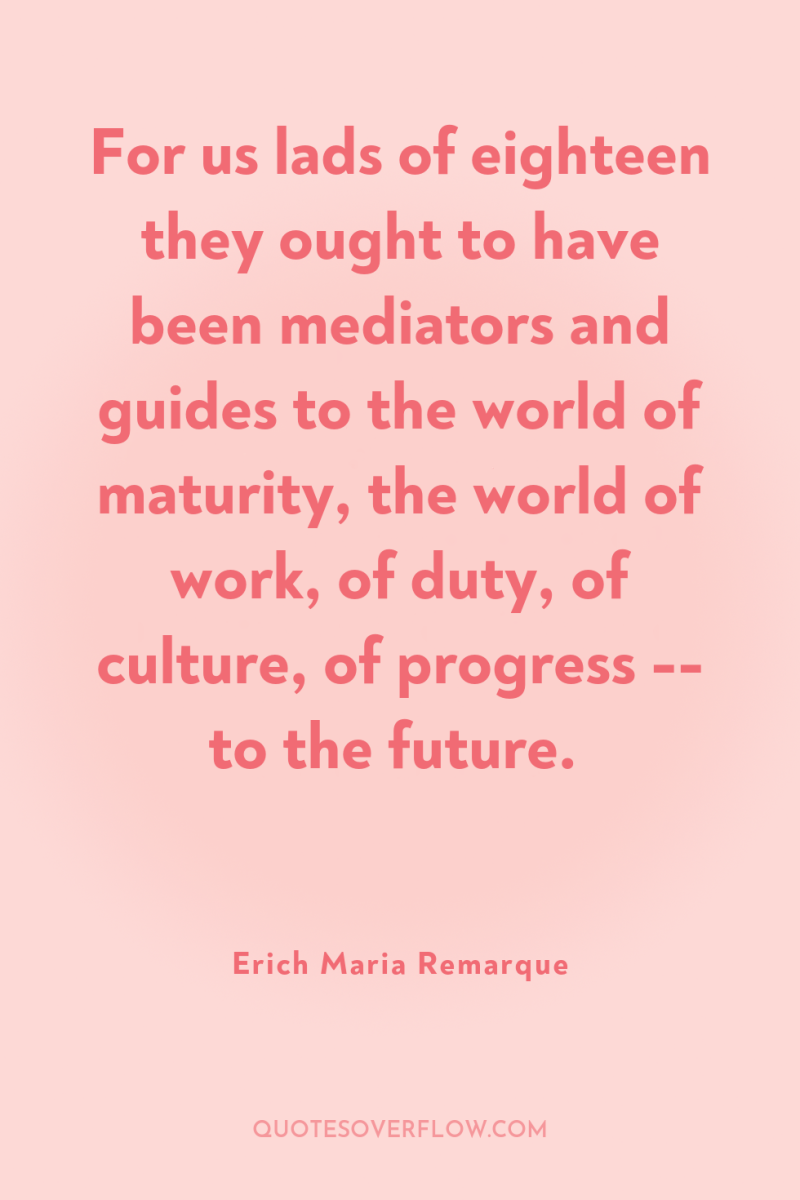
2
For us lads of eighteen they ought to have been mediators and guides to the world of maturity, the world of work, of duty, of culture, of progress -- to the future.Erich Maria Remarque

3
The idea of authority, which they represented, was associated in our minds with a greater insight and a more humane wisdom.Erich Maria Remarque

4
Our knowledge of life is limited to deathErich Maria Remarque

5
We don't act like that because we are in good humor we are in a good humor because otherwise we should go to pieces.Erich Maria Remarque
6
I am young, I am twenty years old; yet I know nothing of life but despair, death, fear, and fatuous superficiality cast over an abyss of sorrow. I see how peoples are set against one another, and in silence, unknowingly, foolishly, obediently, innocently slay one another.Erich Maria Remarque
7
But now, for the first time, I see you are a man like me. I thought of your hand-grenades, of your bayonet, of your rifle; now I see your wife and your face and our fellowship. Forgive me, comrade. We always see it too late. Why do they never tell us that you are poor devils like us, that your mothers are just as anxious as ours, and that we have the same fear of death, and the same dying and the same agony-- Forgive me, comrade; how could you be my enemy? .Erich Maria Remarque
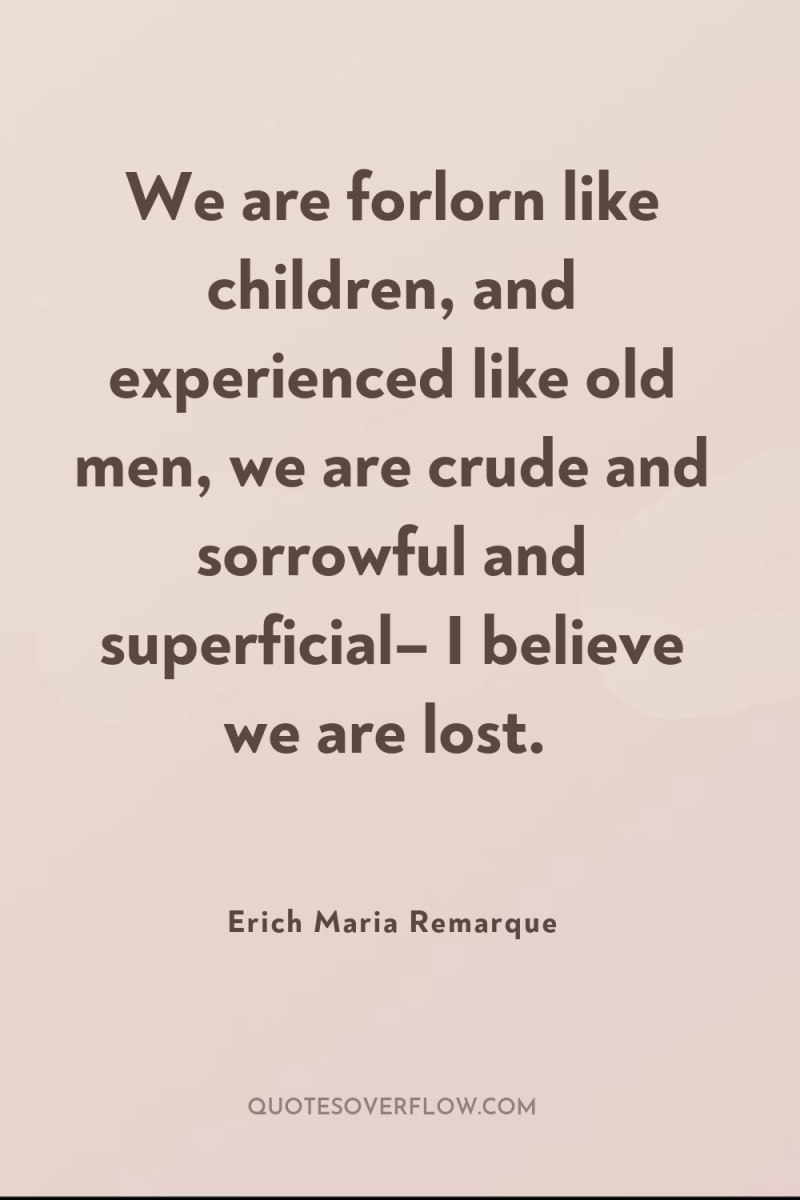
8
We are forlorn like children, and experienced like old men, we are crude and sorrowful and superficial– I believe we are lost.Erich Maria Remarque
9
How senseless is everything that can ever be written, done, or thought, when such things are possible. It must be all lies and of no account when the culture of a thousand years could not prevent this stream of blood being poured out, these torture-chambers in their hundreds of thousands. A hospital alone shows what war is.Erich Maria Remarque
10
We came to realise - first with astonishment, then bitterness, and finally with indifference - that intellect apparently wasn't the most important thing...not ideas, but the system; not freedom, but drill. We had joined up with enthusiasm and with good will; but they did everything to knock that out of us.Erich Maria Remarque
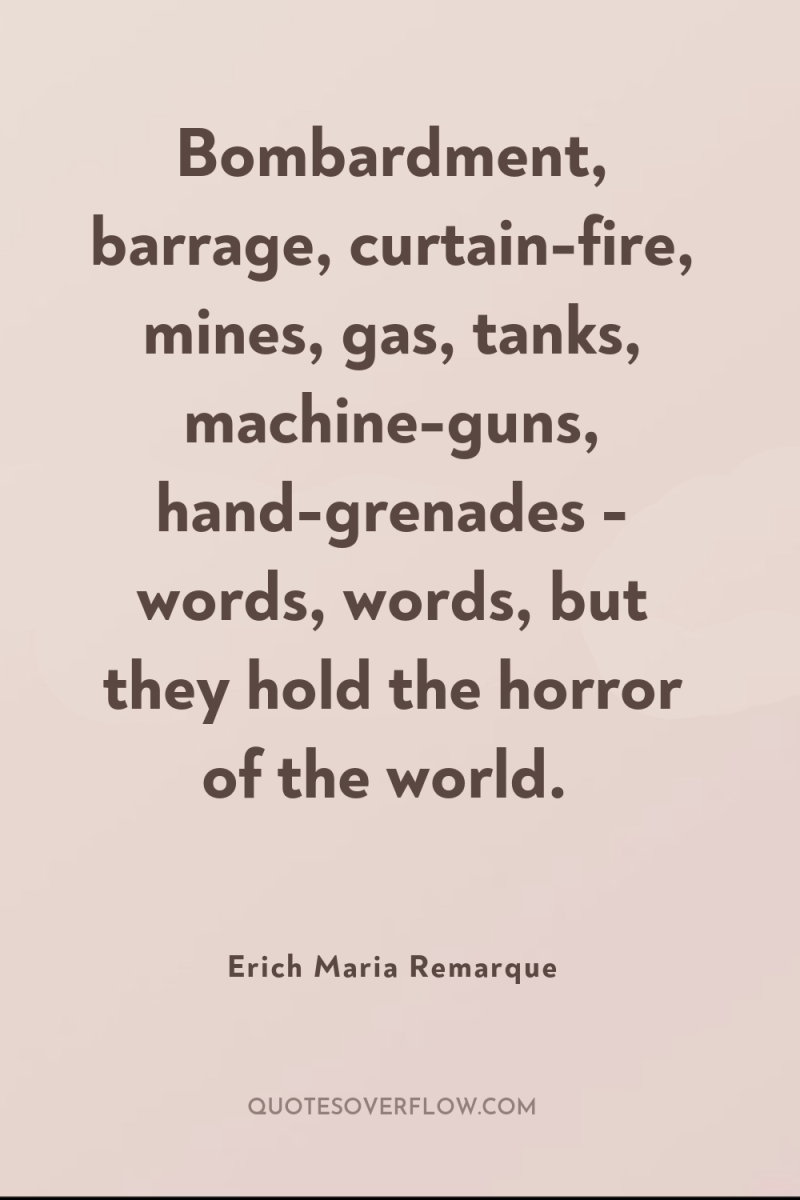
11
Bombardment, barrage, curtain-fire, mines, gas, tanks, machine-guns, hand-grenades - words, words, but they hold the horror of the world.Erich Maria Remarque
12
A man cannot realize that above such shattered bodies there are still human faces in which life goes its daily round. And this is only one hospital, a single station; there are hundreds of thousands in Germany, hundreds of thousands in France, hundreds of thousands in Russia. How senseless is everything that can ever be written, done, or thought, when such things are possible. It must be all lies and of no account when the culture of a thousand years could not prevent this stream of blood being poured out, these torture chambers in their hundreds of thousands. A hospital alone shows what war is.Erich Maria Remarque
13
We're no longer young men. We've lost any desire to conquer the world. We are refugees. We are fleeing from ourselves. From our lives. We were eighteen years old, and we had just begun to love the world and to love being in it; but we had to shoot at it. The first shell to land went straight for our hearts. We've been cut off from real action, from getting on, from progress. We don't believe in those things any more; we believe in the war.Erich Maria Remarque
14
To no man does the earth mean so much as to the soldier. When he presses himself down upon her long and powerfully, when he buries his face and his limbs deep in her from the fear of death by shell-fire, then she is his only friend, his brother, his mother; he stifles his terror and his cries in her silence and her security; she shelters him and releases him for ten seconds to live, to run, ten seconds of life; receives him again and again and often forever.Erich Maria Remarque

15
We know only that in some strange and melancholy way we have become a waste land. All the same, we are not often sad.Erich Maria Remarque

16
The things men did or felt they had to do.Erich Maria Remarque
17
But what I would like to know, " says Albert, "is whether there would not have been a war if the Kaiser had said No.""I'm sure there would, " I interject, "he was against it from the ï¬rst.""Well, if not him alone, then perhaps if twenty or thirty people in the world had said No.""That's probable, " I agree, "but they damned well said Yes.""It's queer, when one thinks about it, " goes on Kropp, "we are here to protect our fatherland. And the French are over there to protect their fatherland. Now who's in the right?"" Perhaps both, " say I without believing it." Yes, well now, " pursues Albert, and I see that he means to drive me into a corner, "but our professors and parsons and newspapers say that we are the only ones that are right, and let's hope so;--but the French professors and parsons and newspapers say that the right is on their side, now what about that?"" That I don't know, " I say, "but whichever way it is there's war all the same and every month more countries coming in." Tjaden reappears. He is still quite excited and again joins the conversation, wondering just how a war gets started." Mostly by one country badly offending another, " answers Albert with a slight air of superiority. Then Tjaden pretends to be obtuse. "A country? I don't follow. A mountain in Germany cannot offend a mountain in France. Or a river, or a wood, or a ï¬eld of wheat."" Are you really as stupid as that, or are you just pulling my leg?" growls Kropp, "I don't mean that at all. One people offends the other--"" Then I haven't any business here at all, " replies Tjaden, "I don't feel myself offended."" Well, let me tell you, " says Albert sourly, "it doesn't apply to tramps like you."" Then I can be going home right away, " retorts Tjaden, and we all laugh, "Ach, man! he means the people as a whole, the State--" exclaims Mller."State, State"--Tjaden snaps his ï¬ngers contemptuously, "Gendarmes, police, taxes, that's your State;--if that's what you are talking about, no, thank you."" That's right, " says Kat, "you've said something for once, Tjaden. State and home-country, there's a big difference."" But they go together, " insists Kropp, "without the State there wouldn't be any home-country."" True, but just you consider, almost all of us are simple folk. And in France, too, the majority of men are labourers, workmen, or poor clerks. Now just why would a French blacksmith or a French shoemaker want to attack us? No, it is merely the rulers. I had never seen a Frenchman before I came here, and it will be just the same with the majority of Frenchmen as regards us. They weren't asked about it any more than we were."" Then what exactly is the war for?" asks Tjaden.Kat shrugs his shoulders. "There must be some people to whom the war is useful."" Well, I'm not one of them, " grins Tjaden."Not you, nor anybody else here."" Who are they then?" persists Tjaden. "It isn't any use to the Kaiser either. He has everything he can want already."" I'm not so sure about that, " contradicts Kat, "he has not had a war up till now. And every full-grown emperor requires at least one war, otherwise he would not become famous. You look in your school books."" And generals too, " adds Detering, "they become famous through war."" Even more famous than emperors, " adds Kat."There are other people back behind there who proï¬t by the war, that's certain, " growls Detering."I think it is more of a kind of fever, " says Albert. "No one in particular wants it, and then all at once there it is. We didn't want the war, the others say the same thing--and yet half the world is in it all the same.Erich Maria Remarque
18
I lie down on many a station platform; I stand before many a soup kitchen; I squat on many a bench;--then at last the landscape becomes disturbing, mysterious, and familiar. It glides past the western windows with its villages, their thatched roofs like caps, pulled over the white-washed, half-timbered houses, its corn-fields, gleaming like mother-of-pearl in the slanting light, its orchards, its barns and old lime trees. The names of the stations begin to take on meaning and my heart trembles. The train stamps and stamps onward. I stand at the window and hold on to the frame. These names mark the boundaries of my youth.Erich Maria Remarque
19
Beside us lies a fair-headed recruit in utter terror. He has buried his face in his hands, his helmet has fallen off. I fish hold of it and try to put it back on his head. He looks up, pushes the helmet off and like a child creeps under my arm, his head close to my breast. The little shoulders heave. Shoulders just like Kemmerich's. I let him be.Erich Maria Remarque
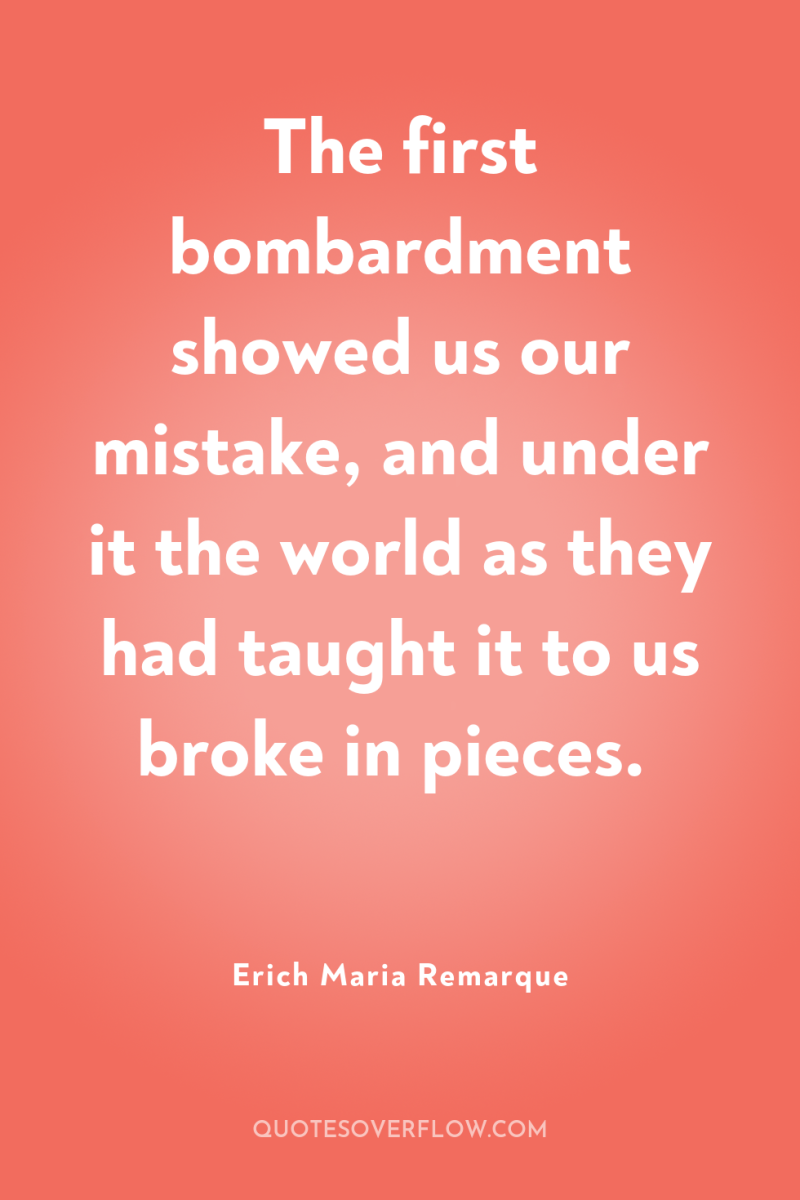
20
The first bombardment showed us our mistake, and under it the world as they had taught it to us broke in pieces.Erich Maria Remarque
21
From the earth, from the air, sustaining forces pour into us--mostly from the earth. To no man does the earth mean so much as to the soldier. When he presses himself down upon her long and powerfully, when he buries his face and his limbs deep in her from the fear of death by shell-fire, then she is his only friend, his brother, his mother; he stifles his terror and his cries in her silence and her security; she shelters him and releases him fro ten seconds to live, to run, ten seconds of life; receives him again and often for ever.Erich Maria Remarque
22
This book is to be neither an accusation nor a confession, and least of all an adventure, for death is not an adventure to those who stand face to face with it. It will try simply to tell of a generation of men who, even though they may have escaped shells, were destroyed by the war.Erich Maria Remarque
23
We were trained in the army for ten weeks and in this time more profoundly influenced than by ten years at school. We learned that a bright button is weightier than four volumes of Schopenhauer. At first astonished, then embittered, and finally indifferent, we recognised that what matters is not the mind but the boot brush, not intelligence but the system, not freedom but drill. We became soldiers with eagerness and enthusiasm, but they have done everything to knock that out of us. After three weeks it was no longer incomprehensible to us that a braided postman should have more authority over us than had formerly our parents, our teachers, and the whole gamut of culture from Plato to Goethe.Erich Maria Remarque
24
I glance at my boots. They are big and clumsy, the breeches are tucked into them, and standing up one looks well-built and powerful in those great drainpipes. But when we go bathing and strip, suddenly we have slender legs again and slight shoulders. We are no longer soldiers but little more than boys; no one would believe that we could carry packs. It is a strange moment when we stand naked; then we become civilians, and almost feel ourselves to be so. When bathing Franz Kemmerich looked as slight and frail as a child. There he lies now -- buy why? The whole world ought to pass by this bed and say: "That is Franz Kemmerich, nineteen and a half years old, he doesn't want to die. Let him not die! .Erich Maria Remarque
25
There were thousands of Kantoreks, all of whom were convinced that they were acting for the best–in a way that cost them nothing. And that is why they let us down so badly. …in our hearts we trusted them. The idea of authority, which they represented, was associated in our minds with a greater insight and a more humane wisdom. But the first death we saw shattered this belief. We had to recognize that our generation was more to be trusted than theirs. They surpassed us only in phrases and in cleverness the first bombardment showed us our mistake, and under it the world as they had taught it to us broke in pieces. While they continued to write and talk, we saw the dying. While they taught that duty to one’s country is the greatest thing, we already knew that death-throes are stronger. But for all that we were no mutineers, no deserters, no cowards–they were very free with all these expressions. We loved our country as much as they; we went courageously into every action; but also we distinguished the false from true, we had suddenly learned to see. And we saw that there was nothing of their world left. We were all at once terribly alone; and alone we must see it through. .Erich Maria Remarque
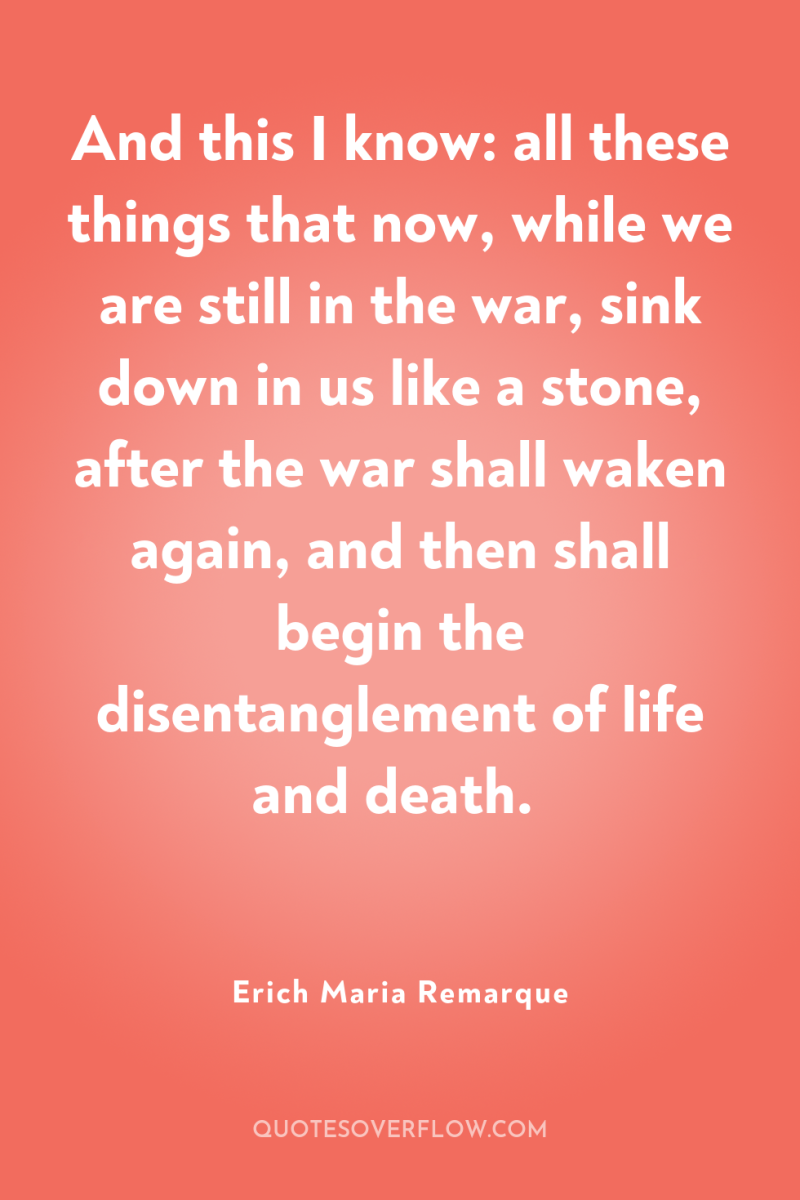
26
And this I know: all these things that now, while we are still in the war, sink down in us like a stone, after the war shall waken again, and then shall begin the disentanglement of life and death.Erich Maria Remarque

27
A man dreams of a miracle and wakes up to loaves of bread.Erich Maria Remarque
28
He wants me to tell him about the front; he is curious in a way that I find stupid and distressing; I no longer have any real contact with him. There is nothing he likes more than just hearing about it. I realize he does not know that a man cannot talk of such things; I would do it willingly, but it is too dangerous for me to put these things into words. I am afraid they might then become gigantic and I be no longer able to master them. What would become of us if everything that happens out there were quite clear to us? .Erich Maria Remarque
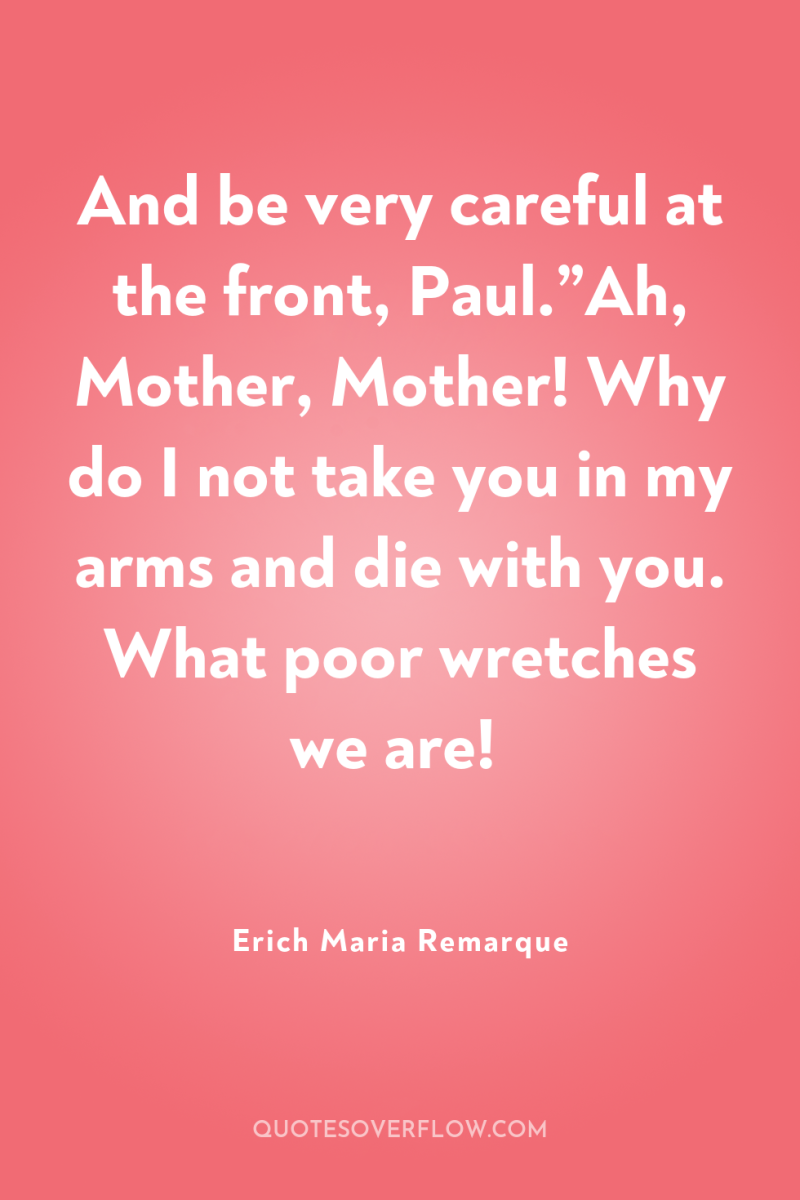
29
And be very careful at the front, Paul.”Ah, Mother, Mother! Why do I not take you in my arms and die with you. What poor wretches we are!Erich Maria Remarque
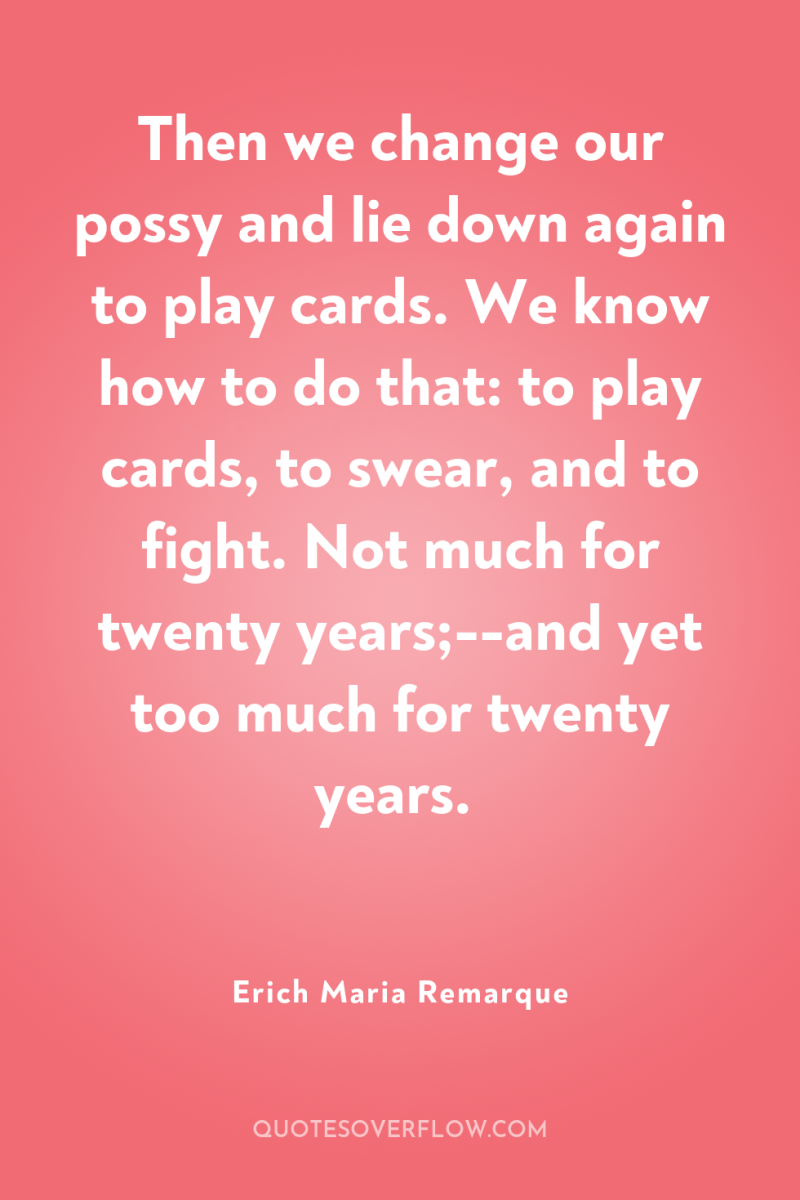
30
Then we change our possy and lie down again to play cards. We know how to do that: to play cards, to swear, and to fight. Not much for twenty years;--and yet too much for twenty years.Erich Maria Remarque
31
And in the night you realize, when you wake out of a dream, overcome and captivated by the enchantment of visions that crowd in on each other, just how fragile a handhold, how tenuous a boundary separates us from darkness - we are little flames, inadequately sheltered by thin walls from the tempest of dissolution and insensibility in which we flicker and are often all but extinguished. Then the muted sounds of battle surrounds us, and we creep into ourselves and stare wide-eyed into the night.Erich Maria Remarque
32
The tension has worn us out. It is a deadly tension that feels as if a jagged knife blade is being scraped along the spine. Our legs won't function, our hands are trembling and our bodies are like thin membranes stretched over barely repressed madness, holding in what would otherwise be an unrestrained outburst of endless scream.s. We have no flesh, no muscle nowErich Maria Remarque

33
We developed a firm, practical feeling of solidarity, which grew, on the battlefield, into the best thing that the war produced - comradeship in arms.Erich Maria Remarque

34
Our heads were full of nebulous ideas, which cast an idealized, almost romantic glow over lifeErich Maria Remarque
35
If only they would not look at one so- What great misery can be in two such small spots, no bigger than a man's thumb-in their eyes!Erich Maria Remarque
36
We were never very demonstrative in our family; poor folk who toil and are full of cares are not so. It is not their way to protest what they already know. When my mother says to me "dear boy, " it means much more than when another uses it.Erich Maria Remarque
37
Here I sit and there you are lying; we have so much to say, and we shall never say it.Erich Maria Remarque
38
The wisest were just the poor and simple people. They knew the war to be a misfortune, whereas those who were better off, and should have been able to see more clearly what the consequences would be, were beside themselves with joy.Erich Maria Remarque
39
We are little flames poorly sheltered by frail walls against the storm of dissolution and madness, in which we flicker and sometimes almost go out.Erich Maria Remarque
40
Close behind us were our friends: Tjaden, a skinny locksmith of our own age, the biggest eater of the company. He sits down to eat as thin as a grasshopper and gets up as big as a bug in the family way; Haie Westhus, of the same age, a peat-digger, who can easily hold a ration-loaf in his hand and say: Guess what I've got in my fist; then Detering, a peasant, who thinks of nothing but his farm-yard and his wife; and finally Stanislaus Katczinsky, the leader of our group, shrewd, cunning, and hard-bitten, forty years of age, with a face of the soil, blue eyes, bent shoulders, and a remarkable nose for dirty weather, good food, and soft jobs.Erich Maria Remarque
41
And so everything is new and brave, red poppies and good food, cigarettes and summer breeze.Erich Maria Remarque
42
Below there are cyclists, lorries, men; it is a grey street and a grey subway;–it affects me as though it were my mother.Erich Maria Remarque
43
These memories of former times do not awaken desire so much as sorrow-- a vast, inapprehensible melancholy. Once we had such desires-- but they return not. They are past, they belong to another world that is gone from us. They are completely lost to us. They arise no more; we are dead and they stand remote on the horizon, they are a mysterious reflection, an apparition that haunts us, that we fear and love without hope. They are unattainable and we know it. And even if these scenes of our youth were given back to us, we would hardly know what to do. The tender, secret influence that passed from them into us could not rise again. We might remember and love them and be stirred by the sight of them. But it would be like gazing at the photograph of a dead comrade; those are his features, it is his face, and the days we spent together take on a mournful life in memory; but the man himself it is not. .Erich Maria Remarque